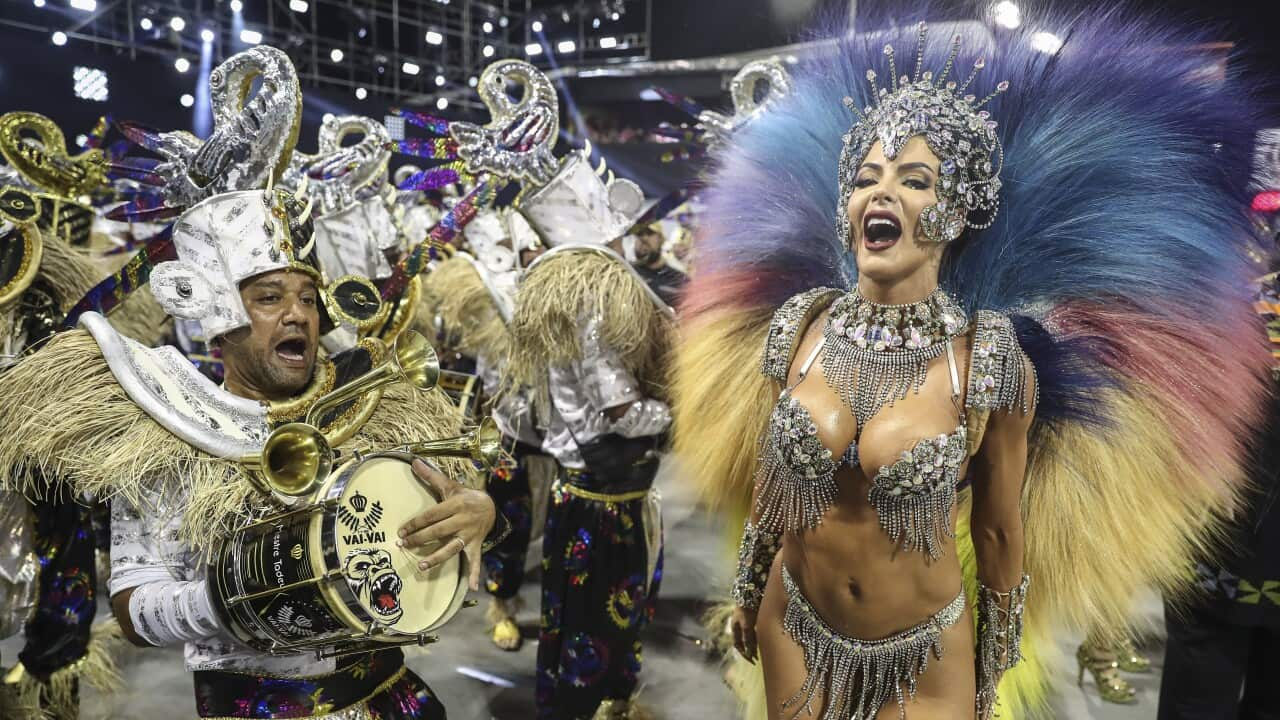After two long years of face masks, social distancing and death, a sparkling sea of dancers, drummers and multi-storey floats reclaimed the "Sambadrome," Rio de Janeiro's carnival parade venue, which previously was turned into a drive-through vaccination centre at the height of the pandemic.
The all-night parades by the city's top samba schools on Friday and Saturday are the first since February 2020, marking a turning point for hard-hit Brazil, where COVID-19 claimed more than 660,000 lives - second only to the United States.
"I'm just so happy. I think a lot of people are going to cry ... including me," said Ana Vieira, a 48-year-old geography teacher, who was wearing a giant, glistening white costume to parade for the Imperatriz samba school.
"Carnival is life. You can see the happiness on people's faces after two long years of staying home and missing it," Vieira, who has been parading for 20 years, told AFP.

Members of samba schools rode on multi-storey floats in Rio de Janeiro's carnival parade. Source: AAP / Sebastiao Moreira/EPA
'Couldn't sleep'
The pandemic had left Brazilians full of "saudades" -- Portuguese for "longing" -- for carnival, a free-for-all of dancing, singing and partying at close quarters that is essentially the opposite of social distancing.
"I couldn't sleep last night, I was so excited," said Rita Marcelino, a 62-year-old domestic worker who was dancing up a storm as she waited to parade - a moment of catharsis after losing her job and "many" friends and family members to the pandemic.
There were concerns carnival would be axed again this year after Rio authorities cancelled it last year and then postponed this edition by two months from the traditional dates -- just before the Catholic season of Lent -- over fears of the Omicron variant spreading.

Carnival has provided some needed relief for the pandemic-battered Brazilian economy. Source: AAP / AGIF/Sipa USA
All participants and the 75,000 attendees expected each night are required to present proof of vaccination.
'Two years of darkness'
Each samba school in the competition has 60 to 70 minutes to tell a story in music and dance, and is evaluated on nine criteria by the jury.
The reigning champions, Viradouro, chose as their theme Rio's epic 1919 carnival -- the first celebrated after the devastation of another pandemic - the Spanish flu.
"No sadness can withstand so much joy," says their samba theme song.
Other schools picked themes charged with social messages, with Brazil facing divisive elections in October expected to pit far-right President Jair Bolsonaro against leftist ex-leader Luiz Inacio Lula da Silva.
Of the 12 schools, eight chose themes dealing with racism or Afro-Brazilian culture and history, loaded issues in a country where the current president has faced frequent accusations of racism.
"Brazil still suffers from racism. Nothing has changed. Slums, hunger, poverty... they have a colour here: black," said Aristoteles Silva, 52, parading as a warrior for samba school Salgueiro, whose theme song was an anti-racist anthem entitled "Resistance."

Each samba school in Rio de Janeiro's carnival competition has 60 to 70 minutes to tell a story in music and dance, which is evaluated on nine criteria by the jury. Source: AAP / Sebastiao Moreira/EPA
Carnival should also provide some needed relief for the pandemic-battered economy.
Beyond the swirl of floats, feathers and barely covered flesh, carnival is big business, moving some four billion reals ($1.15 billion) and creating at least 45,000 jobs, according to official figures.
But street vendor Maria Vitoria Souza, 18, who was selling drinks outside the parades, said sales "could have been better."
"Carnival's still not back 100 per cent, because there are no 'blocos'" -- massive carnival street parties, which city authorities prevented this year.
"But at least it's a start."
Participants were just happy the party was on.
"We've had two years of so much darkness in the world," said Latino Suarez, 45, who travelled from Sao Paulo to join the parade.
"Brazil without carnival isn't Brazil. It's part of who we are."









